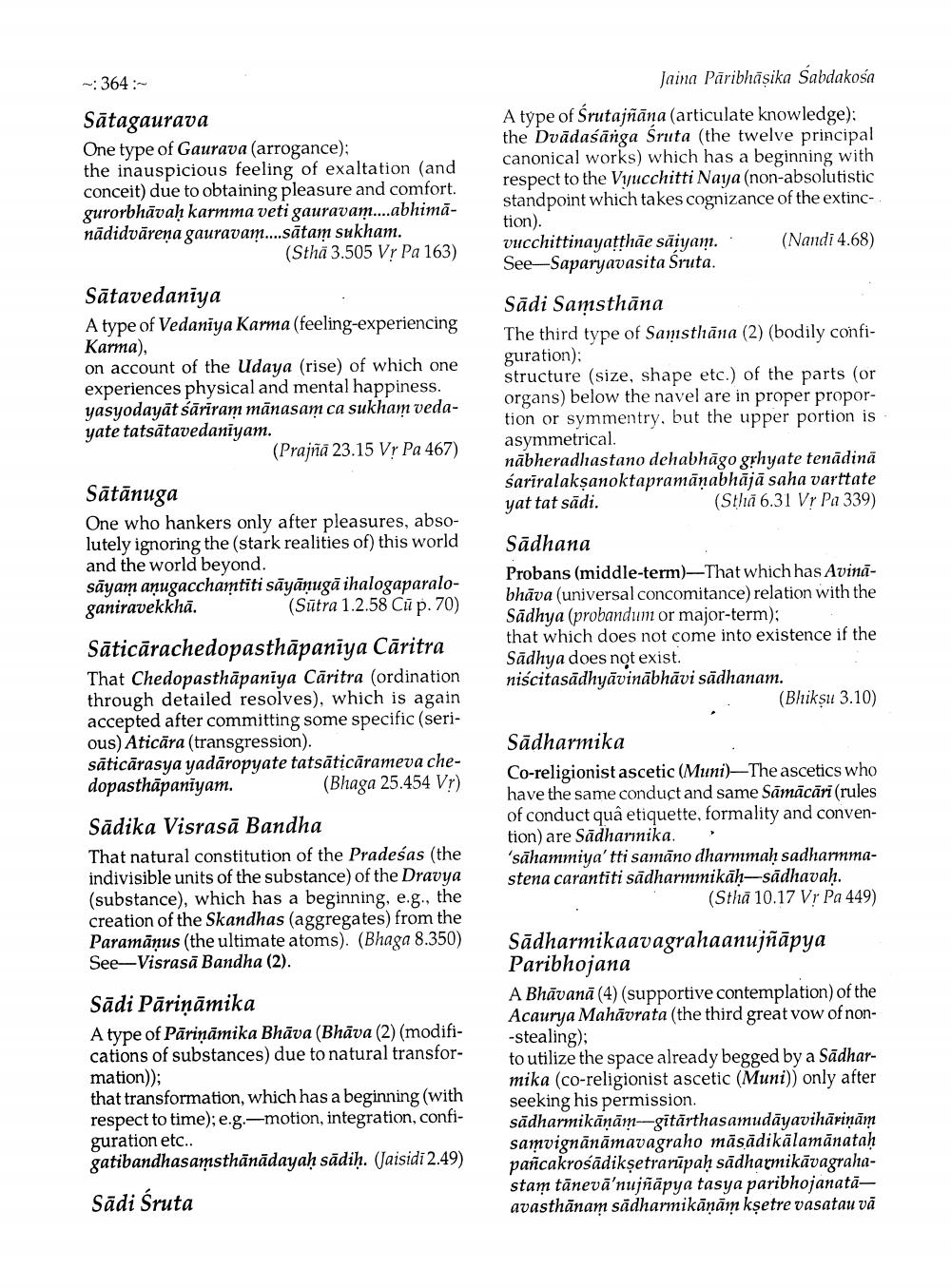________________
~:364
Sātagaurava
One type of Gaurava (arrogance); the inauspicious feeling of exaltation (and) conceit) due to obtaining pleasure and comfort. gurorbhavaḥ karmma veti gauravam....abhimănädidvärena gauravam....satam sukham. (Stha 3.505 Vr Pa 163)
Sātavedaniya
A type of Vedaniya Karma (feeling-experiencing Karma),
on account of the Udaya (rise) of which one experiences physical and mental happiness. yasyodayat sariram manasam ca sukham vedayate tatsätavedaniyam.
(Prajñā 23.15 Vị Pa 467)
Sātänuga
One who hankers only after pleasures, absolutely ignoring the (stark realities of) this world and the world beyond. sayam anugacchamtiti sāyaṇuga ihalogaparaloganiravekkhā. (Sutra 1.2.58 Cap. 70) Säticärachedopasthäpaniya Caritra That Chedopasthäpaniya Cäritra (ordination through detailed resolves), which is again. accepted after committing some specific (serious) Aticara (transgression). säticärasya yadãropyate tatsäticärameva chedopasthapaniyam. (Bhaga 25.454 Vr)
Sadika Visrasā Bandha
That natural constitution of the Pradesas (the indivisible units of the substance) of the Dravya (substance), which has a beginning. e.g.. the creation of the Skandhas (aggregates) from the Paramanus (the ultimate atoms). (Bhaga 8.350) See-Visrasa Bandha (2).
Sādi Pāriņāmika
A type of Pärinämika Bhāva (Bhāva (2) (modifications of substances) due to natural transformation));
that transformation, which has a beginning (with respect to time); e.g-motion, integration, configuration etc.. gatibandhasamsthānādayaḥ sädiḥ. (Jaisidi 2.49)
Sādi Śruta
Jaina Paribhasika Sabdakosa A type of Śrutajñana (articulate knowledge); the Dvadasanga Sruta (the twelve principal canonical works) which has a beginning with respect to the Vyucchitti Naya (non-absolutistic standpoint which takes cognizance of the extinction).
(Nandi 4.68)
vucchittinayaṭṭhāe saiyam. See-Saparyavasita Śruta.
Sādi Samsthāna
The third type of Samsthana (2) (bodily configuration);
structure (size, shape etc.) of the parts (or organs) below the navel are in proper proportion or symmentry, but the upper portion is asymmetrical
nabheradhastano dehabhago grhyate tenadina sariralaksanoktapramanabhäjä saha varttate (Std 6.31 Vr Pa 339)
yat tat sădi.
Sadhana
Probans (middle-term)-That which has Avinābhava (universal concomitance) relation with the Sadhya (probandum or major-term): that which does not come into existence if the Sadhya does not exist. niścitasädhyāvinābhāvi sädhanam.
(Bhiksu 3.10)
Sādharmika
Co-religionist ascetic (Muni)-The ascetics who have the same conduct and same Samācārī (rules of conduct quà etiquette, formality and convention) are Sadharmika.
'sahammiya' tti samano dharmmah sadharmmastena carantiti sädharmmikäh-sädhavaḥ. (Stha 10.17 Vṛ Pa 449)
Sadharmikaavagrahaanujñāpya
Paribhojana
A Bhāvanā (4) (supportive contemplation) of the Acaurya Mahavrata (the third great vow of non-stealing);
to utilize the space already begged by a Sadharmika (co-religionist ascetic (Muni)) only after seeking his permission. sadharmikanām-gitärthasamudayavihāriņām
samvignanamavagraho mäsädikālamanatah pañcakrośādikṣetrarupaḥ sadharmikavagrahastam tāneva'nujñäpya tasya paribhojanataavasthanam sadharmikäṇām kṣetre vasatau va




